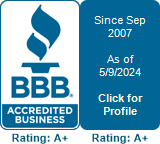Thinking Beyond Theft: 5 Times Your Business Needs Forensic Accounting
- By Admin
- •
- 23 Apr, 2019
- •

When most business owners think about forensic accounting, they generally think about the search for theft. But, in reality, forensic accounting is a valuable tool for many occasions that don't involve someone stealing funds from your business.
What types of situations call for using a forensic accountant? Here are five of the most common.
What types of situations call for using a forensic accountant? Here are five of the most common.
1. During a Divorce
When a business owner or one of the partners becomes involved in a divorce, the business also becomes involved. No matter whether the owner is seeking a divorce or responding to their spouse's petition, the business needs accurately valued. This valuation must be impartial and reliable, or the business could be embroiled in an uglier battle than it needs to be.
2. When Buying or Selling a Business
If you're planning to buy an established business, you need to know exactly what you're getting for your money. Simply looking at the financial statements isn't enough because you don't know where those numbers are coming from.
A forensic accountant will look at the original documents, asset values, and cash flow to verify that the books are accurate, and they will search for hidden dangers like unfinished lawsuits.
Similarly, you may want to work with a forensic accountant if you want to sell your own business. It will help solidify the correct valuation so you get what the business is really worth. For example, a forensic accountant may adjust asset values from book value to market value to determine what their real potential is.
A forensic accountant will look at the original documents, asset values, and cash flow to verify that the books are accurate, and they will search for hidden dangers like unfinished lawsuits.
Similarly, you may want to work with a forensic accountant if you want to sell your own business. It will help solidify the correct valuation so you get what the business is really worth. For example, a forensic accountant may adjust asset values from book value to market value to determine what their real potential is.
3. When Distributing Assets
If you have partners, everyone needs to have confidence in the business books and its valuation. A forensic accountant is an objective third party that can confirm the accounting practices and help you decide how to split assets or interest equitably.
This step is particularly valuable when a partner leaves the company or when one passes away. Your business avoids legal or reputation trouble by establishing the value of that person's interest to the satisfaction of all parties.
Even if you're not adding or losing partners, forensic accounting services helps a partnership avoid conflict and disputes by demonstrating that the finances are being kept above board. Since most partnerships rely on certain members to manage the operations of the business, this helps everyone have confidence in the transparency of how their business is run.
This step is particularly valuable when a partner leaves the company or when one passes away. Your business avoids legal or reputation trouble by establishing the value of that person's interest to the satisfaction of all parties.
Even if you're not adding or losing partners, forensic accounting services helps a partnership avoid conflict and disputes by demonstrating that the finances are being kept above board. Since most partnerships rely on certain members to manage the operations of the business, this helps everyone have confidence in the transparency of how their business is run.
4. Before an Audit
Is the business going to be audited by a government agency? Most agency audits are severely limited in scope, but a few can be daunting. A state or federal tax audit is one of the most potentially harmful audits because everything involving the company's finances could be involved.
Prepare for a big audit by conducting an audit of your own books with a forensic accountant. That way, you learn in advance about anything that might raise a red flag for the auditor — and you have a chance to correct it or determine how to handle it.
Prepare for a big audit by conducting an audit of your own books with a forensic accountant. That way, you learn in advance about anything that might raise a red flag for the auditor — and you have a chance to correct it or determine how to handle it.
5. After a Disaster
As natural disasters become more commonplace — and often more devastating — your company faces the potential loss of records from dangers as diverse as floods, fires, earthquakes, or landslides.
Recovery from such a disaster is a specialty for some forensic accountants. They can help your business reconstruct financial records, determine the value of what you lost, account for business interruption, isolate non-covered damages, and prepare a recovery plan.
There are many other times, of course, when forensic accounting can help your company. If you think that your business might benefit from working with a professional in this field, Williams & Associates Tax Services can help. Call today to make an appointment to assess your specific needs.
Recovery from such a disaster is a specialty for some forensic accountants. They can help your business reconstruct financial records, determine the value of what you lost, account for business interruption, isolate non-covered damages, and prepare a recovery plan.
There are many other times, of course, when forensic accounting can help your company. If you think that your business might benefit from working with a professional in this field, Williams & Associates Tax Services can help. Call today to make an appointment to assess your specific needs.
One vital aspect of a business that demands careful attention is payroll management. Learn why hiring a certified accountant can improve operations.
Turning to a full-service accounting firm to outsource key CFO responsibilities might just be the solution you're looking for. Read to learn more.
Many businesses might make mistakes when filing their tax returns. Learn about a few examples of mistakes and tips on how to avoid the mistakes.
Proper accounting and bookkeeping are vital to the survival of an online business. Read this blog to learn six tips that will make these things easier.
Rather than hiding from your bookkeeping be proactive with it in order to avoid problems. Learn why proper bookkeeping matters more than you thought.
For a small- or medium-sized business owner, taxes may be frustrating. Luckily, you can lower your tax burden. Learn how in this blog.
Every business needs one or more individuals who manage and guide its finances. Learn about the details of what each accounting role does.
Running a business requires a lot of work, and much of that work involves finances. Check out these three reasons you may need forensic financial services.
Errors in bookkeeping can have a large impact on your finances. Read on to learn five common errors and how to safely avoid them in the future.











